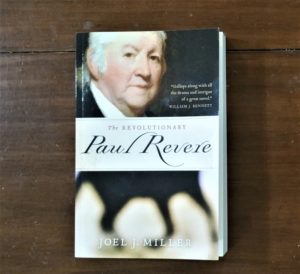Here is an action-packed account of the life of one of our country’s most romanticized historical figures. The author briefly discusses the events of Revere’s life while giving the subject due credit for being as significant to the Revolution as any Bostonian. This book is more of a report on Revere’s family, business, and on the events Revere was involved in while leaving out ideological or philosophical examinations of Revere’s political leanings. Revere was a patriot; that was his politics. And he expressed his patriotism in some incredible actions that still ring out in history with inspiring awe. This book captures those events with excitement. We recommend this to all.
Taught to us at an early age, Revere’s midnight ride to warn the patriots at Lexington and Concord that the British army was on their way was a significant event in the creation of our country and Revere is the story’s unquestionable hero. But his contribution to the fight for democracy was not limited to that one iconic horseback ride in 1775. Revere was the leader of the Boston harbor spy ring that kept tabs on all movements of the British army and navy, he participated in the Boston Tea Party, he attended rallies at the Liberty Tree, served in the Revolutionary War, and engraved one of the more famous depictions of the Boston Massacre. He also made numerous other rides as an express messenger from Boston to Philadelphia, which in those days on horseback through pitch black conditions and rough terrain was a not an easy task.
Revere did all of this while owning a small business and raising a large family. As a professional he was considered an artisan which for Revere meant he was a blacksmith, wielder, mechanic, mill owner, innovator, and you can even add dentist to his list of trades. At home he fathered eight children with his first wife who died of exhaustion. Then he fathered eight more with his second wife. Unfortunately Revere outlived most of his sixteen children.
As for his political views, the book does not touch on them much. There is the mention that Revere supported the ratification of the Constitution, but the author does not delve into why. Instead the focus is on the action, of which there is plenty. There is one great line on how Revere felt about the government’s involvement in economic matters; “there is no greater destroyer of wealth than misguided government.” Hear, hear.
The only disappointment I found from this book was that there was no emphasis on the famous ride to Lexington and Concord. The ride is of course included and told well, but in the book it stands shoulder to shoulder with the rest of his accomplishments. This is, however, consistent in the flow of the story, but I felt it failed to highlight the ride as the consequential moment that it was (for a great book on the ride itself check out Paul Revere’s Ride by David Hackett Fischer).
The book ends with the death of Revere at the old age of eighty-six. A sad but peaceful ending in how Revere lived through the Revolution while outliving so many close to him. The author quotes one of the notices published immediately after Revere’s passing that really captures his life, as well as the theme of this book; “a life so honorable and useful.”

.